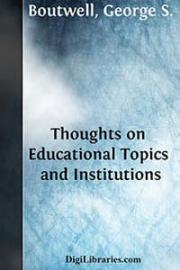
Thoughts on Educational Topics and Institutions
Words and terms have, to different minds, various significations; and we often find definitions changing in the progress of events. Bailey says learning is "skill in languages or sciences." To this, Walker adds what he calls "literature," and "skill in anything, good or bad." Dr. Webster enlarges the meaning of the word still more, and says, "Learning is the knowledge of principles or facts received by instruction or study; acquired knowledge or ideas in any branch of science or literature; erudition; literature; science; knowledge acquired by experience, experiment, or observation." Milton gives us a rhetorical definition in a negative form, which is of equal value, at least, with any authority yet cited. "And though a linguist," says Milton, "should pride himself to have all the tongues that Babel cleft the world into, yet if he have not studied the solid things in them, as well as the words and lexicons, he were nothing so much to be esteemed a learned man, as any yeoman or tradesman competently wise in his mother dialect only."—"Language is but the instrument conveying to us things useful to be known."



